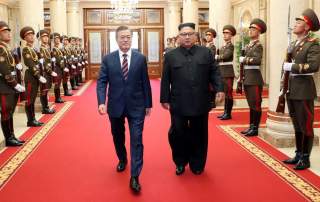Welcome to the Showdown Over South Korea's Seoul
Old peninsula problems could resurface for South Korea if Moon Jae-in does not avoid the pitfalls that his political predecessors fell prey to.
Almost immediately in the wake of the signing of an end-of-war declaration, the UN Command, shorn of its mission to defend the peace in the peninsula, would be dismantled. Moreover, OPCON transfer, now envisioned to be completed by 2020, would defang and dismantle the Combined Forces Command. Why? Despite protestations to the contrary, no U.S. commander would submit his command over U.S. forces—the preeminent military in the world—to a foreign commander in the actual prosecution of war. The joint communique of the recently concluded 50th U.S.-ROK Security Consultative Meeting (SMC) states that the two sides, following OPCON transfer, shall “maintain the current CFC structure” and that the post–OPCON transfer CFC shall “have an ROK four-star general as the Commander and a U.S. four-star general as the Deputy Commander” (Paragraph 9). It’s a proposition that sounds as credible as Richard Nixon’s promise to Park Chung-hee that no U.S. troops will be withdrawn just a year before the withdrawal of an entire division of twenty thousand soldiers.
A peace treaty between the United States and the DPRK, a long-held goal by North Korea, would call into question rationale for maintaining U.S. troops in South Korea. If and when such a treaty comes into effect, then the question “Why are the troops there, in South Korea, when the U.S. and North Korea have a peace treaty?” would be raised repeatedly by politicians and the public in Seoul and Washington, not to mention Pyongyang, Beijing, and Moscow.
Once the U.S. forces leave South Korea, the bilateral alliance will be that only in name. Beyond the loss of credible U.S. commitment to the defense of the ROK, the virtual abrogation of the alliance would leave some glaring holes in the ROK’s defense capabilities, for example: Surveillance-reconnaissance-signal intelligence capabilities, early warning and missile defense, counter-battery fire and sensitive military technology procurement abilities, just to name a few. The political ramifications of no longer nestling under an “ironclad” alliance with the United States also would be significant, as Seoul would lack the politico-military clout to resist sanctions and censorship by Beijing, Moscow, or Pyongyang, or even whitewashing of historical crimes by Japan. China’s unabashed wielding of the stick on South Korea for its missile defense deployment, even with staunch support from the United States, is a lesson that should not be forgotten.
South Korea today, in its unhedged bet to embrace the Kim Jong-un regime, would be well served to remember the lessons of the Korean past: alliances gone askance, misjudgment of the strategic environment, and finding itself abandoned, vulnerable and stateless.
Sung-Yoon Lee is Kim Koo-Korea Foundation Professor of Korean Studies and assistant professor at The Fletcher School of Law and Diplomacy at Tufts University.
Image: Reuters

